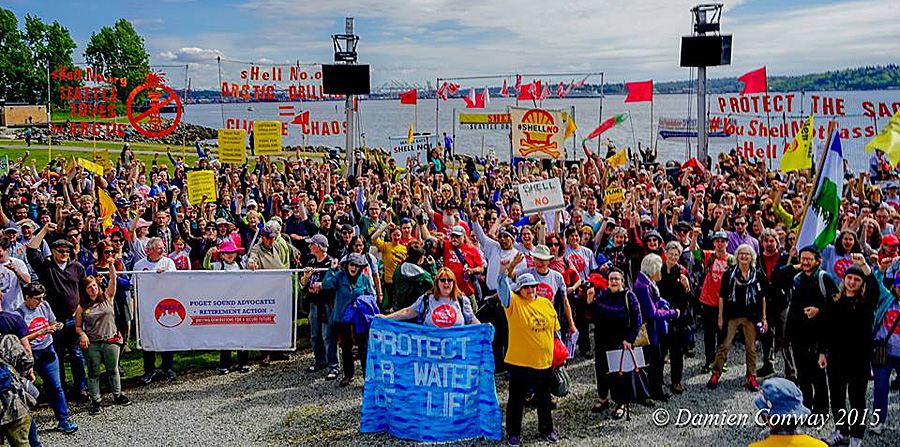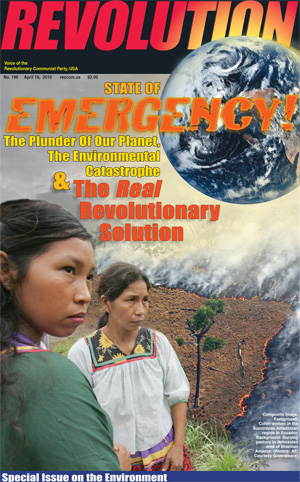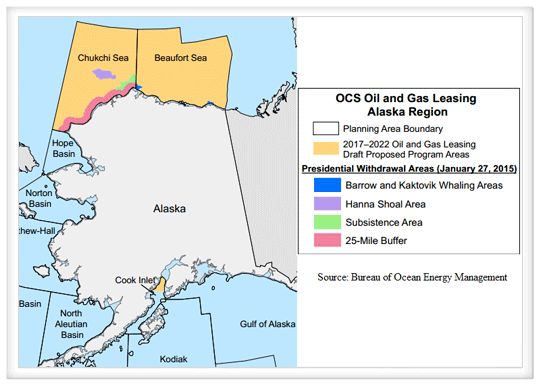The Fight to Stop Arctic Drilling, the Stakes for the Planet
May 11, 2015 | Revolution Newspaper | revcom.us
Editor's note: On May 11, the Obama administration approved Shell’s drilling plan, further clearing the way for them to start drilling in the Chukchi sea this summer. Now, all Shell requires is the administration to approve their particular drilling permits.

April 29, an environmental group called “Shell No” organized a Seattle protest of the drilling for fossil fuels in the Arctic. (Photo: Damien Conway)
Ocean Ecosystems in Crisis
Drilling in the Arctic Ocean, and burning fossil fuels from the Arctic, would further accelerate a developing crisis in the oceans and on the planet.
Ocean ecosystems are the basis of all life. The plankton in the oceans provides 50 percent of the oxygen we breathe and forms the basis of a web of fish life that one billion people rely on for their only protein. But due to the on-going and relentless predations under the expanding economic activity of world capitalism, the oceans are in deep trouble. 90 percent of the oceans' top predators have been eliminated. Eighty percent of the commercial fish stocks are fully exploited or over-exploited. Huge trawlers with immense nets as long as 25 miles are sucking up and literally wiping out huge populations of ocean life. Coral reefs, which are rich garden oases of life forming the base and linking all ocean life, are dying off due to the warming of the seas. Overfishing, pollution, and the clogging of the oceans with plastics are contributing to an overall crisis. All over the world, populations of many species are plummeting. A major study of the oceans this year concluded that the oceans “may be sitting on the precipice of a major extinction event.”(See “The Accelerating Destruction of Our Planet, the Need for Urgent Transformation,” January 26, 2015.)
450 regions of the ocean have now been declared dead zones, devoid of oxygen and incapable of sustaining life due to pollution’s effect on algae growth. This number has grown tremendously over the past several decades. The oceans have been sucking up enormous amounts of heat from global warming caused by the build-up of greenhouse gases. The oceans now threaten to belch that heat back into the atmosphere, accelerating dangerous warming. Huge migrations of species and disruption of ecosystems are underway in the oceans as ranges of species change with changing ocean temperature gradients. The vast ice masses in the Arctic, and also parts of the Western Antarctic ice shelves in the south, are melting at increasing rates, damaging these ecosystems and their regulation of world climate. The chemistry of the oceans themselves is being turned more acidic, threatening much of the base of life. The crisis of the oceans is part of and linked to a global environmental crisis that threatens our future. It is accelerating and life-threatening.
It is truly stunning, as the movie Planet Ocean put it—in “barely 200 years we have disrupted four billion years of biological history.” This is not due to humanity in the abstract, but to the outcome of a capitalist system where countries and companies are driven to expand profitability, to grow and expand relentlessly, and beat out other competitors, no matter the cost to our planet.
For more on the beauty and the crisis in the oceans, see the documentary Planet Ocean
This summer, a critical front in the battle to save the planet’s environment is shaping up. Shell Oil is preparing to restart drilling for oil and natural gas in the Arctic waters north of Alaska.
The destructive practices of capitalism, especially its burning of fossil fuels, is warming the planet and causing the melting of polar ice. This is leading to potentially devastating consequences for polar ecosystems. And not only this. Melting at the poles is destabilizing the planet’s climate and threatens to further accelerate global warming as the sun’s energy is reflected less and absorbed more by open water than by ice. Further, the melting of this ice threatens the world with catastrophic sea level rise.
Now, after setting loose all this destruction that threatens everything, instead of putting an immediate halt to it, the world’s powers are scrambling to compete over who can best exploit this as an opportunity. It’s been estimated that the Arctic could contain as much as 22 percent of the world’s remaining undiscovered oil and large quantities of natural gas. So the world powers are racing against each other to gain control of the now more accessible Arctic oil and gas, and to gain control of the newly opened summer shipping lanes. Shell is charting the way for U.S. companies to follow, even as Canada, Russia, Norway, and others step up their bids to exploit the transforming conditions in the Arctic Ocean in other regions.
Shell has plans to bring two drilling rigs into the Seattle harbor this month, before towing them to Alaska, and environmental groups in the Northwest have announced plans to block them. Already, activists with Greenpeace mounted Shell’s Polar Pioneer drilling rig as it was being towed across the Pacific and camped out for a week in protest of Shell’s plans.
An environmental coalition called “Shell No!” is organizing the Seattle protests. Their website says “Drilling for Arctic oil is an open attack on people in the global south, who are already losing communities to rising seas and extreme weather. It could also spell disaster for one of the most unique wilderness areas on the planet and all of its inhabitants....We will unite in creative action, including a mass water-based blockade, and an event focused on working to honor our connections with this beautiful and complex planet. These events will build to a day of Mass Direct Action on Monday May 18th, when we will use nonviolent action to SHUT DOWN SHELL and all operations related to their Arctic expedition.”
These actions are very important to spread and support given the tremendous ecological stakes involved in preventing any drilling for fossil fuels in the Arctic.
The Race for the Arctic
This summer, Shell is targeting the Chukchi Sea, north and west of Alaska. The Chukchi is one of the most pristine and productive ocean ecosystems left on the planet. It is a rich ecosystem sustaining polar bears, walruses, whales, many species of seabirds, and several kinds of seals. All of this life is dependent on the sea ice and the organisms that thrive in relation to it. Many of these species are already endangered or threatened; as the sea ice in the region recedes, shorelines erode and sea temperatures rise. Also severely threatened is a whole culture of the indigenous Inupiat people that has been based on harvesting life from the sea to sustain their way of life for thousands of years. Drilling in the region would bring yet another danger—from oil spills.
In 2012, Shell began exploratory drilling in the Arctic and ran into huge problems. Their drilling rig Kulluk broke loose while being towed in rough water and ran aground. Their other rig, the Discoverer, almost drifted ashore and at another time caught fire. When examined by the Coast Guard, the Discoverer had 16 safety violations. This year, Obama’s Bureau of Ocean Energy Management (BOEM)—which decides on drilling leases—admitted that there would be a 75 percent chance of a major oil spill over the life of the lease that would result in a massive loss of polar bears and seals, and decimation of the bird population. Yet they still allowed the lease to go ahead! There is no reason to believe that Shell, or any other oil company, has the capacity to prevent or control oil spills, no matter what they say. In fact spills are routine and constant, and the danger has not lessened since the disastrous Gulf of Mexico oil spill.

Drummers from the Inupiat people who depend on the sea for their livelihood, now severely threatened by oil drilling. (Photo: Floyd Davidson)
The danger is made worse by the remoteness and extremity of conditions in the very harsh Arctic waters, which are ice covered much of the year, and prone to extreme storms and other difficult weather. A major oil spill in the Arctic would be a disaster to life there. Despite these problems and dangers to such a rich environment, the Obama administration has continued to facilitate Shell and other companies in pursuing Arctic drilling.
Beyond the spill threat, there is another overriding reason why the oil in the Arctic should not be exploited. A January 2015 study in the scientific magazine Nature showed for the first time that to prevent global temperature from rising above 2 degrees Celsius (it is generally agreed that more than this will bring on catastrophe), that a third of oil reserves, one half of gas reserves and more than 80 percent of coal reserves would have to remain unused. This study further stated that developing fossil fuels in the Arctic or increasing unconventional oil production would make it impossible to limit global warming to 2 degrees C.
Given all this, the idea of further threatening this rich ecosystem with the possibility of spilling oil that would decimate life in the Arctic, and expanding exploitation of fossil fuels in the Arctic, makes no rational sense. But this system does not make decisions based on the needs of people or the environment. Profitability and beating out other powers is embedded in every decision. Capitalism is not capable of taking account of the needs of these ecosystems or people, or the long-term needs of the planet’s ecology

This Revolution special issue focuses on the environmental emergency that now faces humanity and Earth’s ecosystems. In this issue we show:
- the dimensions of the emergency...
- the source of its causes in the capitalist system, and the impossibility of that system solving this crisis...
- a way out and way forward for humanity—a revolutionary society in which we could actually live as custodians of nature, rather than as its plunderers.
Read online....
Also available in brochure format (downloadable PDF)
There is increasing pressure among the world’s powers to grab and control these resources before their rivals do. This is reflected within U.S ruling class circles. In March, Senator Lisa Murkowski, who is chair of the Senate Energy and Resource Committee, held a hearing on the need for the U.S. to further exploit the Arctic and said the U.S. is “woefully behind” and needs to catch up to others. U.S. military advisors have also been directing attention for the U.S. to increase its ability to project its forces into the region in preparation for a vast scrambling among powers to cash in on fossil fuel exploration and new shipping lanes created by the melting of sea ice.
In seeking to maintain some legitimacy for the U.S. among millions of people who care about the environment, in January 2015 Obama withdrew certain regions along the Arctic Alaskan coastline and other key wildlife areas from being opened to drilling. But along with this, he opened up much larger swaths of the open Alaska waters in the Chukchi and Beaufort Seas. At the same time he opened huge areas of the Atlantic Ocean to selling of leases for oil drilling for the first time. Both of these decisions are made from the strategic position of preserving the interests of U.S. capitalism-imperialism and its competition with other powers, and directly opposed to the interests of protecting the planet or its people.
Shell still has to receive final approval for drilling permits, and the mayor of Seattle has thrown a kink in the works by requiring Shell to get new permits before carrying out work at Seattle ports. How this will work out isn’t yet clear.
Stop the Drilling!

This Arctic drilling can’t be allowed! It’s important that all the efforts to stop Arctic drilling be spread and the legitimacy of the whole system be exposed so the drilling can’t proceed. The stakes are simply too high for anything else to happen. In this it is important that those standing up to stop this follow through on their convictions, and not stop until the drilling and the environmental destruction of the planet is stopped. From our view, this will require a revolution, and stepping up mass resistance should be linked to building a powerful movement for revolution. We need a new socialist system, where the entire energy foundation of society and the way humanity relates to nature is transformed. We need a socialist system, moving toward emancipating all of humanity, that can meet people’s needs while allowing us to preserve, protect, and work to reverse and mitigate the damage to global ecosystems. There is a way out. There is a strategy for making revolution and the necessary leadership for making it. And there is a plan for a new socialist sustainable society with an approach to making the transformations needed. Now is the time for people to take this up, as they fight to save the planet.
Volunteers Needed... for revcom.us and Revolution
If you like this article, subscribe, donate to and sustain Revolution newspaper.






